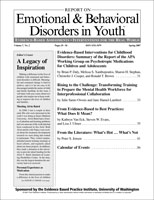Child-Parent Psychotherapy: Facilitating Factors and Barriers to Implementation in the National Child Traumatic Stress Network
Author: Elizabeth Douglas, M.S..; Bryan Seck, M.P.A..; Bhuvana Sukumar, Ph.D..; Christine Walrath, Ph.D..
Source: Volume 11, Number 02, Spring 2011 , pp.46-53(8)

< previous article |next article > |return to table of contents
Abstract:
In recent years, a number of effective clinical approaches and interventions have been developed and tested for use in treating trauma-exposed children. One such therapy is child-parent psychotherapy, a relationship-based, dyadic clinical intervention designed to address exposure to trauma, internalizing and externalizing symptoms, and symptoms of traumatic stress among infants, toddlers, and preschoolers who have experienced domestic violence. Although the primary focus is on children who have witnessed domestic violence, the intervention strategies apply to many forms of child maltreatment. The intervention integrates multiple theories, including psychodynamic, attachment, trauma, cognitive-behavioral, and social-learning, to restore the child-parent relationship and the child’s mental health and developmental progression that have been damaged by the experience of domestic violence. This article examines the use of CPP, its advantages, limitations, barriers to wider implementation, and strategies for its appropriate application.Keywords: Adverse Childhood Experiences (ACE) study; National Center for Child Traumatic Stress (NCCTS); practitioners’ clinical experience; training and supervision
Affiliations:
1: ICF Macro; 2: ICF Macro; 4: ICF Macro.